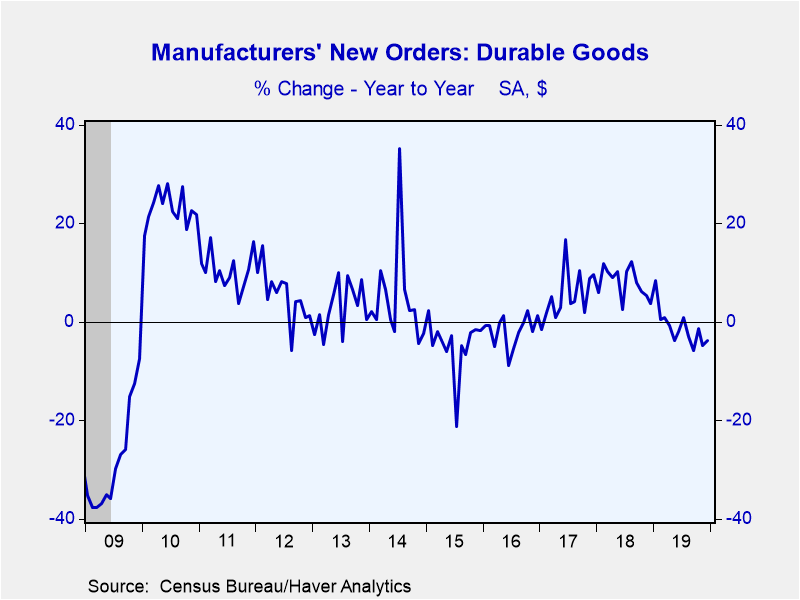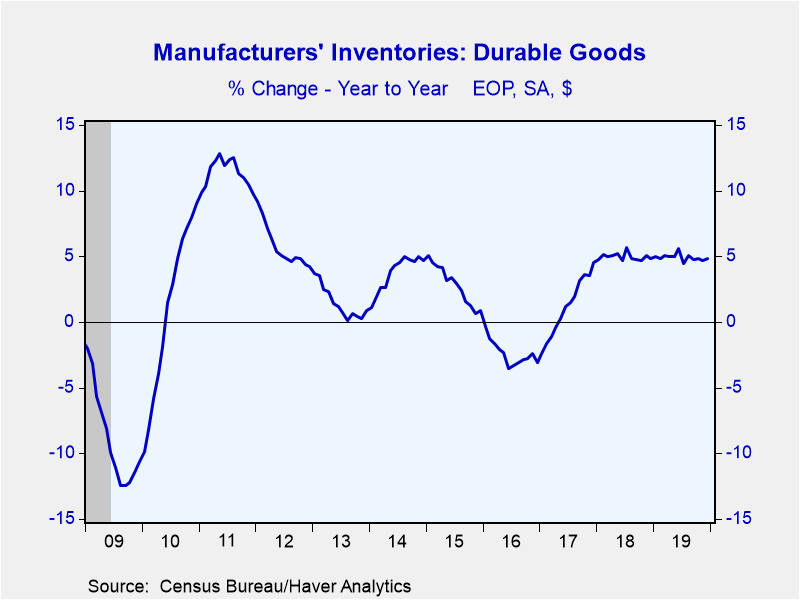 Global| Jan 28 2020
Global| Jan 28 2020TT
Summary
The advance reading for November indicated that durable goods orders fell 2.0% m/m (-3.7% y/y) following a 0.2% m/m rise in October, revised down from 0.6%. A 1.5% increase had been expected in the Action Economics Forecast Survey. [...]
The advance reading for November indicated that durable goods orders fell 2.0% m/m (-3.7% y/y) following a 0.2% m/m rise in October, revised down from 0.6%. A 1.5% increase had been expected in the Action Economics Forecast Survey. The primary cause for the unexpected outsized decline was a 72.7% m/m collapse in orders for defense aircraft, which led to a 38.2% m/m drop in overall defense orders. Orders excluding defense rose 0.8% m/m in November following an unchanged reading in October. So, apart from weakness in defense, the report was not as weak as the headline decline indicated.
The durable goods figures are available in Haver's USECON database. The Action Economics consensus forecast figure is in the AS1REPNA database.
| Durable Goods NAICS Classification | Dec | Nov | Oct | Dec Y/Y | 2019 | 2018 | 2017 |
|---|---|---|---|---|---|---|---|
| New Orders (SA, % chg) | 2.4 | -3.1 | 0.2 | -3.7 | -1.3 | 7.9 | 5.4 |
| Transportation | 7.6 | -8.3 | 0.0 | -8.4 | -4.3 | 9.8 | 3.2 |
| Total Excluding Transportation | -0.1 | -0.4 | 0.2 | -1.0 | 0.4 | 6.9 | 6.5 |
| Nondefense Capital Goods Excl. Aircraft | -0.9 | 0.1 | 1.0 | 1.0 | 0.9 | 6.0 | 6.7 |
| Shipments | -0.2 | -0.1 | -0.1 | -3.2 | 1.2 | 7.1 | 4.0 |
| Nondefense Capital Goods Excl. Aircraft | -0.4 | -0.3 | 0.7 | 0.0 | 2.1 | 6.3 | 5.6 |
| Unfilled Orders | -0.1 | -0.6 | 0.0 | -2.2 | -2.2 | 3.9 | 1.9 |
| Inventories | 0.5 | 0.4 | 0.3 | 4.8 | 4.8 | 4.8 | 4.5 |
Gerald D. Cohen
AuthorMore in Author Profile »Gerald Cohen provides strategic vision and leadership of the translational economic research and policy initiatives at the Kenan Institute of Private Enterprise.
He has worked in both the public and private sectors focusing on the intersection between financial markets and economic fundamentals. He was a Senior Economist at Haver Analytics from January 2019 to February 2021. During the Obama Administration Gerald was Deputy Assistant Secretary for Macroeconomic Analysis at the U.S. Department of Treasury where he helped formulate and evaluate the impact of policy proposals on the U.S. economy. Prior to Treasury, he co-managed a global macro fund at Ziff Brothers Investments.
Gerald holds a bachelor’s of science from the Massachusetts Institute of Technology and a Ph.D. in Economics from Harvard University and is a contributing author to 30-Second Money as well as a co-author of Political Cycles and the Macroeconomy.
More Economy in Brief
 Global| Feb 05 2026
Global| Feb 05 2026Charts of the Week: Balanced Policy, Resilient Data and AI Narratives
by:Andrew Cates









